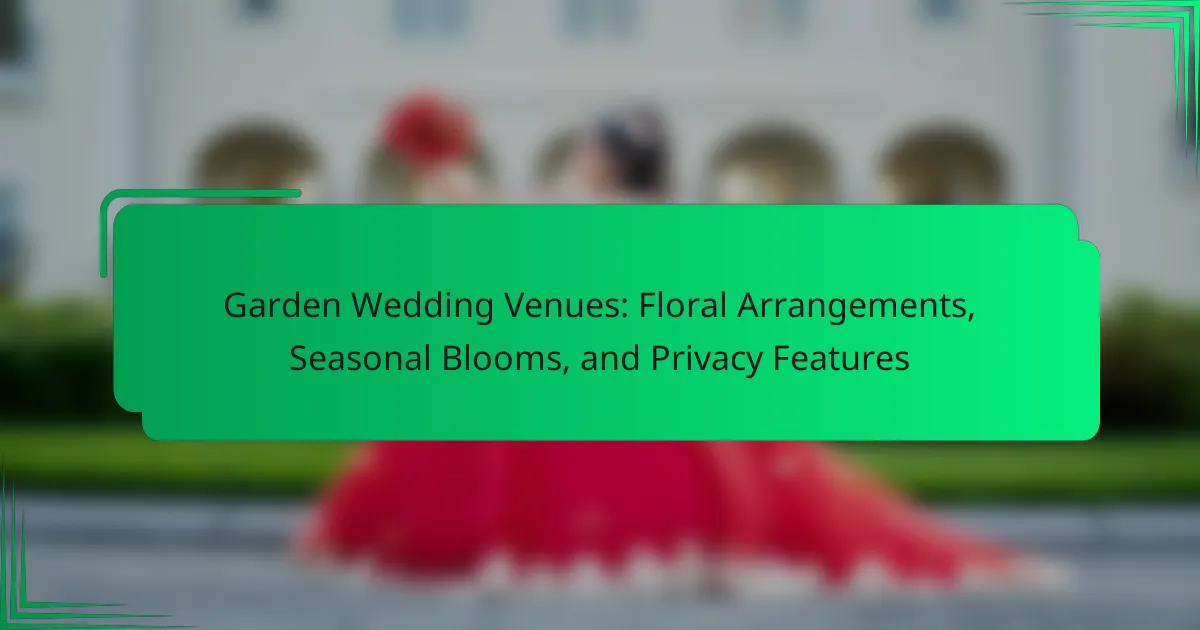Garden wedding venues are outdoor locations designed for wedding ceremonies and receptions, characterized by lush greenery, floral arrangements, and scenic landscapes that enhance the event’s beauty. The article explores the significance of floral arrangements, detailing seasonal blooms suitable for garden weddings, such as peonies and roses, which contribute to the overall ambiance. Additionally, it addresses essential privacy features for these venues, including natural barriers and layout design, which help create an intimate atmosphere for couples and guests. Overall, the content provides a comprehensive overview of how garden venues can be optimized to enhance the wedding experience through aesthetics and privacy.
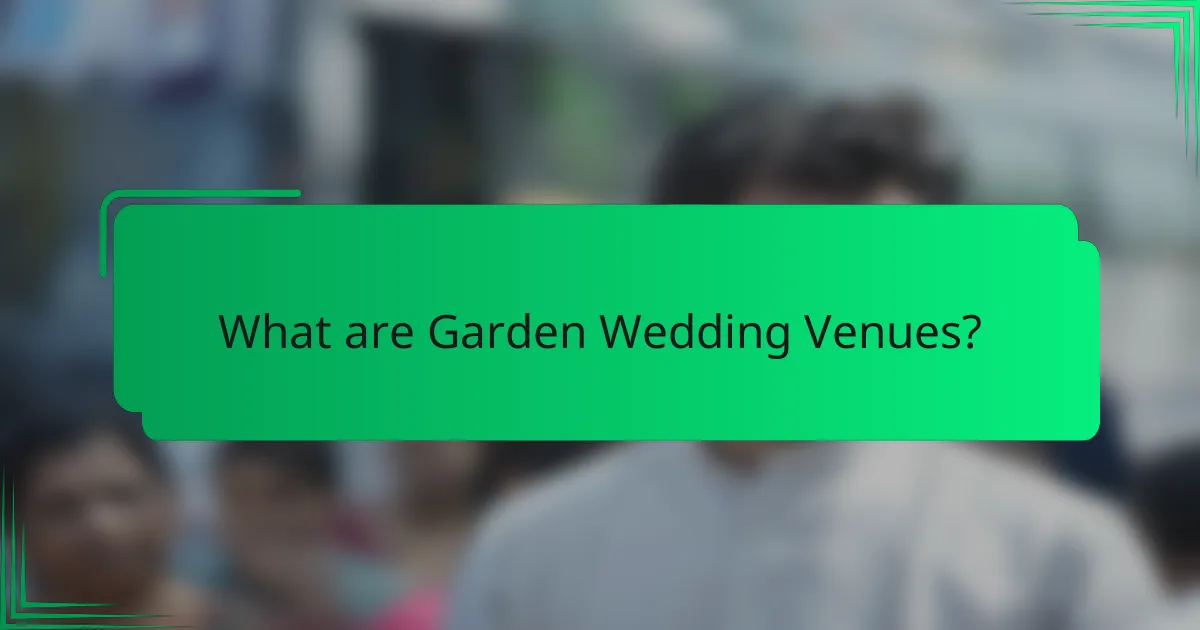
What are Garden Wedding Venues?
Garden wedding venues are outdoor locations specifically designed for hosting wedding ceremonies and receptions. These venues typically feature lush greenery, floral arrangements, and scenic landscapes. They provide a natural backdrop that enhances the beauty of the event. Many garden venues offer privacy, allowing couples to celebrate without disturbances. Some may include amenities like gazebos, pergolas, or dedicated spaces for dining and dancing. The appeal of garden venues lies in their romantic ambiance and connection to nature. Statistics show that outdoor weddings have increased in popularity, with many couples opting for garden settings.
Why choose a garden wedding venue over traditional options?
A garden wedding venue is often chosen over traditional options for its natural beauty and unique ambiance. Garden venues provide a picturesque backdrop with vibrant flowers and lush greenery. This setting enhances the overall aesthetic of the wedding. Additionally, gardens offer more space for outdoor activities and guest mingling. Many couples appreciate the serene atmosphere that gardens create, promoting a relaxed vibe. Privacy is another key factor; gardens can be more secluded than conventional venues. This separation from urban noise allows for an intimate celebration. Furthermore, garden venues can often accommodate larger guest lists, making them versatile for various wedding sizes.
What unique experiences do garden venues provide for couples?
Garden venues provide couples with immersive natural settings for their weddings. These locations often feature vibrant floral arrangements that enhance the romantic atmosphere. Seasonal blooms create unique backdrops that change throughout the year, adding distinctiveness to each event. Couples can enjoy privacy, as many garden venues are secluded, allowing for intimate celebrations. The serene environment promotes relaxation and connection among guests. Additionally, garden venues often offer customizable spaces, enabling couples to personalize their ceremonies. Many gardens include picturesque pathways and water features, enhancing the visual appeal. Overall, garden venues combine natural beauty with a tranquil ambiance for memorable experiences.
How do garden venues enhance the overall wedding atmosphere?
Garden venues enhance the overall wedding atmosphere by providing a natural and picturesque backdrop. The lush greenery and vibrant flowers create a romantic setting. This connection to nature fosters a sense of tranquility and joy. Garden venues often feature unique landscaping that adds character and charm. Seasonal blooms contribute to the aesthetic appeal, ensuring a fresh look throughout the year. Privacy features in garden venues create an intimate environment for the couple and guests. This seclusion allows for personal moments and meaningful interactions. Overall, the combination of beauty and serenity in garden venues elevates the wedding experience.
What types of garden wedding venues are available?
Garden wedding venues include public parks, botanical gardens, private estates, and country clubs. Public parks offer natural beauty and open spaces for ceremonies. Botanical gardens feature curated plant collections and scenic backdrops. Private estates provide exclusive access and customizable settings. Country clubs often have landscaped gardens and amenities for receptions. Each venue type enhances the wedding experience with unique floral arrangements and seasonal blooms.
What are the characteristics of public gardens as wedding venues?
Public gardens as wedding venues are characterized by their natural beauty and scenic landscapes. They often feature diverse flora, providing a picturesque backdrop for ceremonies. Public gardens typically offer ample space for both intimate and larger gatherings. Many have designated areas for events, ensuring a structured setting. Accessibility is a key attribute, as these venues are usually open to the public. They often provide amenities like seating, restrooms, and parking facilities. The seasonal blooms enhance the aesthetic appeal, creating vibrant settings throughout the year. Additionally, public gardens can offer a sense of tranquility, allowing couples to celebrate in a serene environment.
How do private estates differ from public gardens for weddings?
Private estates offer exclusivity, while public gardens are open to everyone. Private estates typically have controlled access, ensuring privacy for the wedding event. This exclusivity allows for personalized decorations and arrangements tailored to the couple’s preferences. In contrast, public gardens may have restrictions on decor and setup due to shared space.
Private estates often provide amenities like on-site accommodations and catering options. Public gardens usually do not offer such services and may require couples to arrange for outside vendors. Additionally, private estates can accommodate larger guest lists without the limitations often found in public gardens.
The overall atmosphere in private estates can be more intimate and customizable. Public gardens, while beautiful, may have a less personalized feel due to their open nature. These differences make private estates generally more suitable for couples seeking a unique and private wedding experience.
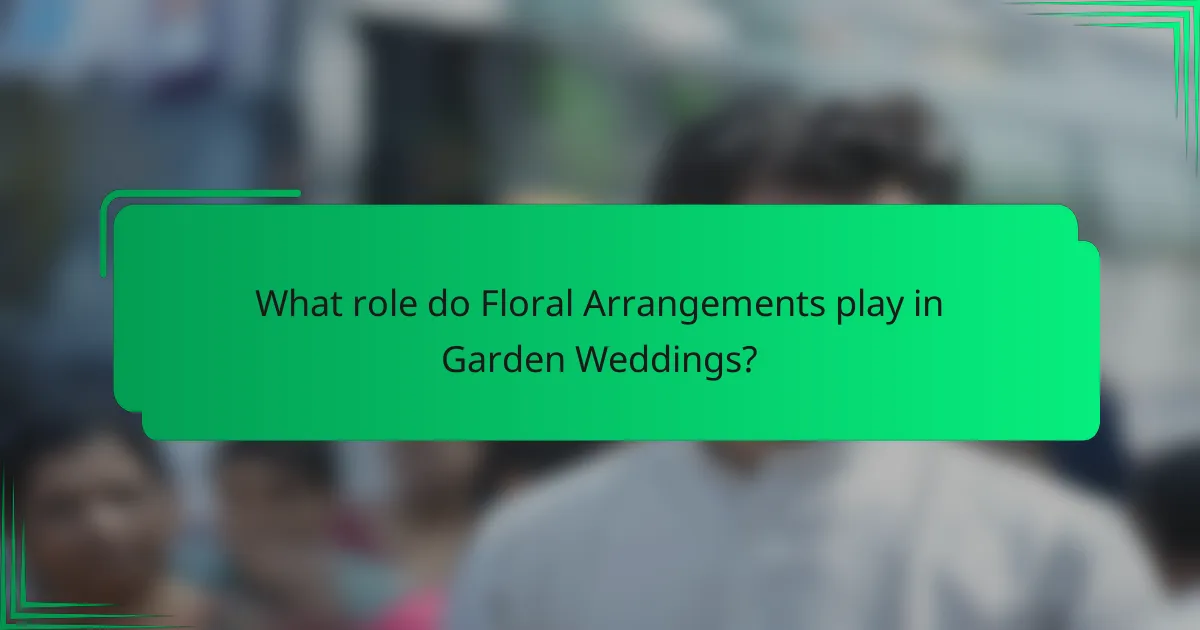
What role do Floral Arrangements play in Garden Weddings?
Floral arrangements play a crucial role in garden weddings by enhancing the aesthetic appeal of the venue. They create a visually stunning backdrop that complements the natural beauty of the garden. Arrangements can be tailored to the couple’s theme and color palette, adding a personal touch. Seasonal blooms are often used to ensure freshness and vibrancy, aligning with the time of year. Additionally, floral arrangements can define spaces within the garden, such as the ceremony area and reception. They also serve symbolic purposes, representing love and celebration. Overall, floral arrangements contribute significantly to the ambiance and emotional atmosphere of garden weddings.
How can floral arrangements enhance the beauty of a garden wedding?
Floral arrangements enhance the beauty of a garden wedding by adding color, texture, and fragrance. They create a visually stunning backdrop for the ceremony. Specific flowers can complement the natural surroundings and theme of the wedding. For instance, vibrant blooms can contrast beautifully with greenery. Additionally, floral arrangements can define spaces, guiding guests through the venue. They also contribute to the overall atmosphere, making it more romantic and inviting. Studies show that floral elements can improve emotional responses, enhancing the wedding experience for attendees.
What types of flowers are commonly used in garden wedding arrangements?
Roses, peonies, and hydrangeas are commonly used in garden wedding arrangements. Roses symbolize love and come in various colors. Peonies offer a lush, romantic look and bloom in late spring to early summer. Hydrangeas provide a voluminous appearance and are available in several shades. Other popular choices include lilies, daisies, and ranunculus. Each flower adds a unique aesthetic to the wedding decor. Seasonal availability influences the selection of these blooms.
How do seasonal flowers influence floral design choices?
Seasonal flowers significantly influence floral design choices by dictating color palettes and texture variations. Designers select blooms based on their availability during specific seasons. For example, spring offers tulips and daffodils, which inspire bright and fresh arrangements. In contrast, autumn brings rich hues with chrysanthemums and dahlias, leading to warmer designs. Furthermore, seasonal flowers affect the overall theme of an event. A garden wedding in summer may feature vibrant sunflowers, enhancing a cheerful atmosphere. Seasonal availability also impacts cost, as locally sourced flowers tend to be more affordable. This relationship between seasonality and design ensures that floral arrangements align with the natural beauty of the venue.
What are the best practices for selecting floral arrangements?
Select floral arrangements based on the event’s theme and color palette. Consider the season to choose blooms that are fresh and in season. Evaluate the size of the venue to determine the scale of arrangements needed. Assess the preferences of the couple for personal touches. Research local florists for quality and reliability. Check for allergies among guests to avoid problematic flowers. Review the arrangement’s longevity to ensure they last throughout the event. Finally, establish a budget to guide selection and avoid overspending.
How do personal styles and themes affect floral selection?
Personal styles and themes significantly influence floral selection for events like weddings. Individuals often choose flowers that reflect their personal aesthetic or the overall theme of the event. For instance, a vintage theme may lead to selections of garden roses and peonies, while a modern theme might favor sleek orchids and calla lilies.
Colors also play a crucial role. A romantic style may opt for soft pastels, while a bold theme might choose vibrant hues. Seasonal availability further affects choices. Couples may select blooms that are in season to ensure freshness and cost-effectiveness.
Ultimately, personal preferences and thematic elements guide decisions, resulting in unique floral arrangements that enhance the overall atmosphere of the event.
What budget considerations should couples keep in mind for floral arrangements?
Couples should consider their overall budget when planning floral arrangements. The cost of flowers can vary significantly based on type and seasonality. Seasonal blooms tend to be more affordable than out-of-season varieties. Couples should also account for additional expenses like delivery, setup, and vase rentals. It’s important to prioritize which floral elements are essential, such as bouquets and centerpieces. Research indicates that couples can save by choosing local florists over larger chains. Establishing a clear budget early can help avoid overspending.
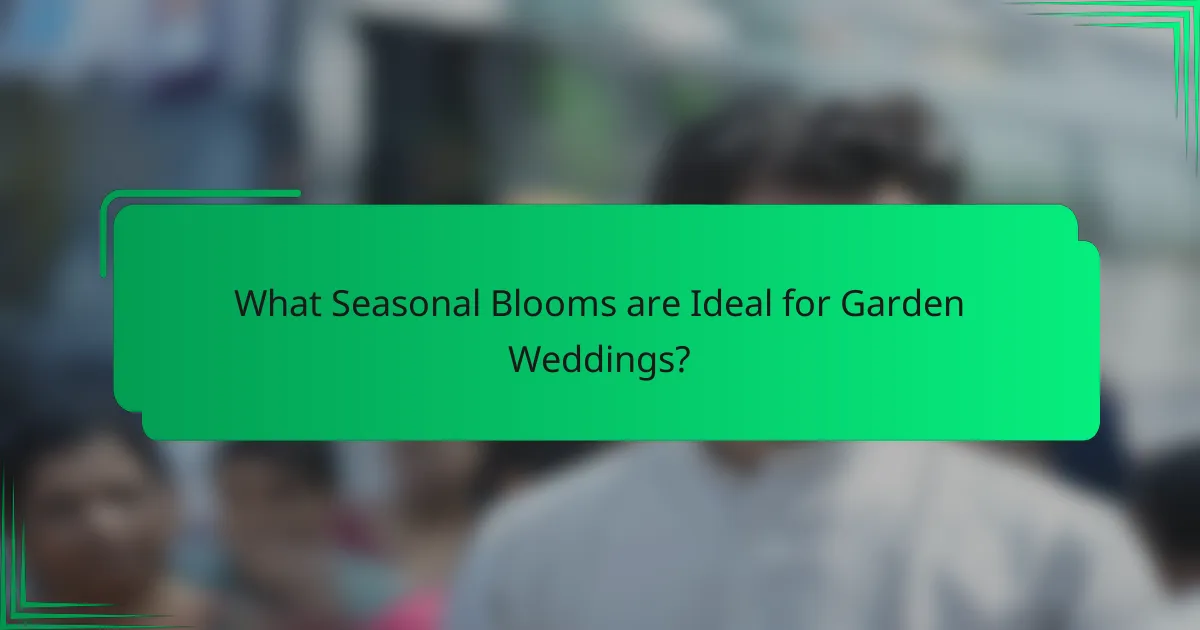
What Seasonal Blooms are Ideal for Garden Weddings?
Spring blooms ideal for garden weddings include peonies, tulips, and daffodils. Peonies are known for their lush petals and vibrant colors. Tulips offer a variety of shapes and hues, making them versatile. Daffodils symbolize new beginnings and add a cheerful touch.
In summer, roses, hydrangeas, and sunflowers are popular choices. Roses are classic and come in many colors, representing love. Hydrangeas provide a full, bushy look with their large flower heads. Sunflowers bring a bright, sunny vibe to any arrangement.
Fall weddings can feature chrysanthemums, asters, and dahlias. Chrysanthemums are hardy and come in various colors. Asters add a delicate touch and bloom late in the season. Dahlias are known for their unique shapes and rich colors.
Winter weddings can utilize evergreens, amaryllis, and poinsettias. Evergreens provide a lush backdrop and symbolize endurance. Amaryllis offers striking blooms that stand out in winter arrangements. Poinsettias are festive and add a traditional holiday feel.
These seasonal blooms enhance the beauty of garden weddings and align with the natural setting.
How do seasons affect flower availability for weddings?
Seasons significantly affect flower availability for weddings. Different flowers bloom in specific seasons, influencing choices for wedding arrangements. For instance, spring offers peonies and tulips, while summer features sunflowers and dahlias. Autumn brings chrysanthemums and roses, and winter offers options like amaryllis and holly. Availability varies based on climate and location. Local sourcing can enhance freshness and reduce costs. Understanding seasonal blooms helps couples select appropriate flowers for their wedding date.
What flowers are in bloom during spring for garden weddings?
Spring blooms for garden weddings include tulips, daffodils, peonies, and lilacs. Tulips are available in various colors, making them versatile for arrangements. Daffodils add a cheerful yellow hue, symbolizing rebirth. Peonies are popular for their lush, full blooms and sweet fragrance. Lilacs bring a lovely scent and soft purple tones to the garden. These flowers typically bloom from March to June, aligning perfectly with spring weddings. Their availability during this season makes them ideal choices for couples.
Which summer blooms are best suited for outdoor ceremonies?
Roses, peonies, hydrangeas, and sunflowers are the best summer blooms for outdoor ceremonies. Roses offer classic beauty and a variety of colors. Peonies are lush and fragrant, perfect for romantic settings. Hydrangeas provide large blooms that create a stunning visual impact. Sunflowers add a cheerful and vibrant touch to arrangements. These flowers thrive in summer conditions and are widely available during the season. Their popularity in weddings is supported by their aesthetic appeal and versatility in floral designs.
How can couples incorporate seasonal blooms into their wedding decor?
Couples can incorporate seasonal blooms into their wedding decor by selecting flowers that are in bloom during their wedding month. This ensures vibrant colors and fresh scents. For example, spring weddings may feature tulips and daffodils, while summer weddings can include sunflowers and peonies.
Using seasonal blooms can also reduce costs since these flowers are more readily available. Couples can create stunning centerpieces with seasonal arrangements. Bouquets can include a mix of seasonal flowers for a cohesive look.
Additionally, floral archways or installations can be designed using blooms that reflect the season. Seasonal flowers can also be used in boutonnieres and corsages for the wedding party. This approach not only enhances the decor but also celebrates the natural beauty of the season.
What are creative ways to use seasonal flowers in centerpieces?
Seasonal flowers can be used creatively in centerpieces by incorporating them into various arrangements. One approach is to mix different types of seasonal blooms for a vibrant display. Using flowers at varying heights adds visual interest. Another idea is to use seasonal flowers in combination with natural elements like twigs or stones. This creates a rustic look that enhances the floral arrangement. Additionally, consider using seasonal flowers in unconventional containers, such as mason jars or wooden boxes. This adds a unique touch to the centerpiece. Seasonal flowers can also be arranged in clusters to create a bold statement piece. Incorporating greenery alongside the flowers provides contrast and depth. Finally, using flowers that match the wedding theme or color palette ensures cohesion in the overall decor.
How can seasonal blooms be used in wedding attire and accessories?
Seasonal blooms can be incorporated into wedding attire and accessories in various ways. Flowers can be used in bridal bouquets, adding a fresh and vibrant touch. Seasonal blooms can also be featured in floral crowns or hairpieces for brides and bridesmaids. Boutonnieres made from seasonal flowers can adorn the groom and groomsmen, enhancing their attire. Additionally, floral accents can be sewn into dresses or suits for a unique look. Seasonal blooms can be used in table centerpieces or as embellishments on wedding invitations. These floral elements reflect the natural beauty of the wedding season. Using seasonal blooms ensures that the flowers are fresh and readily available, contributing to a cohesive theme.
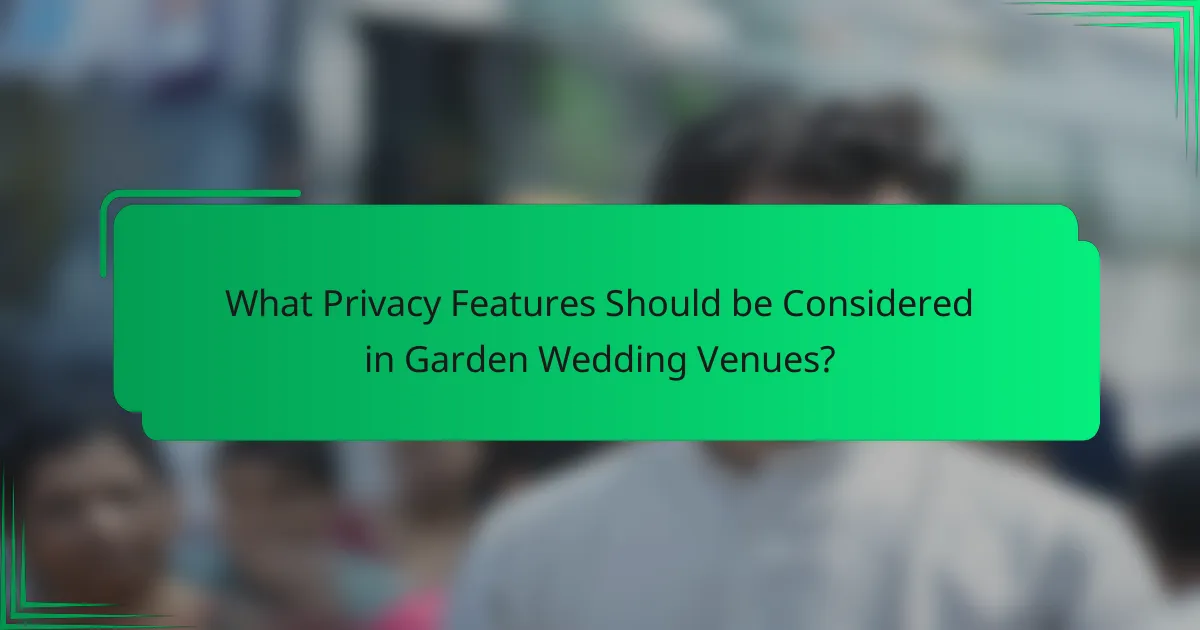
What Privacy Features Should be Considered in Garden Wedding Venues?
Garden wedding venues should consider features like natural barriers, layout design, and restricted access. Natural barriers such as tall hedges or trees provide visual privacy. A well-thought-out layout can create secluded areas for the ceremony and reception. Restricted access ensures that only invited guests can enter the venue. These features enhance the overall experience by minimizing distractions and maintaining an intimate atmosphere. Research shows that privacy is a key factor in guest satisfaction at events.
Why is privacy important for garden wedding venues?
Privacy is important for garden wedding venues because it ensures an intimate atmosphere for couples and their guests. A private setting allows for personal moments without interruptions. It also protects the couple from uninvited guests or onlookers. Privacy enhances the overall experience by creating a serene environment. Additionally, it allows for personalized decorations and arrangements without external distractions. A study by the Wedding Report indicates that 70% of couples prioritize privacy when selecting a venue. This highlights the significance of privacy in making the wedding day special.
What types of privacy features can enhance a garden wedding experience?
Privacy features that can enhance a garden wedding experience include natural barriers, strategic layout, and designated areas. Natural barriers such as hedges, trees, or tall plants provide visual separation from the outside. These elements create a secluded atmosphere, allowing guests to feel more intimate. Strategic layout involves positioning seating and decor to shield the ceremony space from external views. This arrangement fosters a sense of exclusivity. Designated areas, like private nooks or lounges, offer guests a space to retreat for conversation. These features contribute to a comfortable and personal wedding experience.
How do natural elements contribute to privacy in garden settings?
Natural elements enhance privacy in garden settings through the strategic use of plants, trees, and landscaping features. Dense foliage creates natural barriers that obstruct views from outside. Tall trees can serve as vertical screens, blocking sightlines effectively. Hedges and shrubs can be shaped to form living walls, providing seclusion. Additionally, climbing plants on trellises can add layers of privacy. The use of natural materials in fences can blend with the environment, maintaining an aesthetic appeal. Research indicates that greenery can reduce noise, further enhancing the sense of privacy. Collectively, these elements create a serene and intimate atmosphere suitable for events like weddings.
What are the best practices for ensuring privacy at a garden wedding?
To ensure privacy at a garden wedding, use strategic landscaping and physical barriers. Tall hedges and trees can create a natural enclosure. Fencing can also delineate the area and provide security. Additionally, consider scheduling the event during off-peak hours to minimize foot traffic. Inviting only select guests can further enhance privacy. Utilize signage to inform the public of the private event. Employing a professional security team can deter uninvited guests. Lastly, consider using privacy screens or drapes in open spaces. These measures can significantly enhance the intimate atmosphere required for a garden wedding.
How can couples choose venues that prioritize privacy?
Couples can choose venues that prioritize privacy by selecting locations that are secluded or have natural barriers. Look for gardens that are surrounded by tall hedges, trees, or walls to block outside views. Research venues that specifically advertise private spaces for events. Consider booking during off-peak times to ensure fewer guests and more intimacy. Verify if the venue has exclusive use policies to limit outside access. Read reviews to find feedback on the privacy experiences of past couples. Ensure the venue layout includes designated areas for the ceremony and reception that are away from public areas.
What strategies can be implemented to maintain a private atmosphere during the ceremony?
To maintain a private atmosphere during the ceremony, consider using natural barriers like hedges or trees. These elements can create a secluded space, limiting visibility from outside. Additionally, select a venue that has a designated area for ceremonies, ensuring it is away from public pathways. Employing decorative screens or drapes can further enhance privacy. Limit the guest list to close friends and family to create an intimate setting. Schedule the ceremony during off-peak hours to avoid crowds. Lastly, communicate with guests about the importance of privacy, encouraging them to respect the space. These strategies collectively contribute to a more private and serene wedding experience.
What tips can help couples plan their ideal garden wedding?
Couples can plan their ideal garden wedding by selecting the right venue. A venue with diverse flora enhances the aesthetic appeal. Consider the season for optimal flower availability. Spring offers vibrant blooms, while autumn provides rich colors. Couples should also assess the venue’s privacy features. A secluded area ensures an intimate atmosphere. Planning for weather contingencies is crucial. Tents or canopies can provide shelter from unexpected rain. Additionally, incorporating personal touches makes the wedding unique. Custom floral arrangements can reflect the couple’s style. Lastly, hiring a wedding planner experienced in garden settings can streamline the process.
Garden wedding venues are outdoor locations designed for wedding ceremonies and receptions, featuring natural elements like greenery and floral arrangements that enhance the event’s beauty. The article covers the appeal of garden venues, including their unique ambiance, privacy features, and the types of venues available, such as public parks and private estates. It also discusses the significance of floral arrangements, seasonal blooms, and best practices for selecting flowers to align with wedding themes. Additionally, the article highlights strategies for ensuring privacy during the ceremony, making it a comprehensive guide for couples planning a garden wedding.
